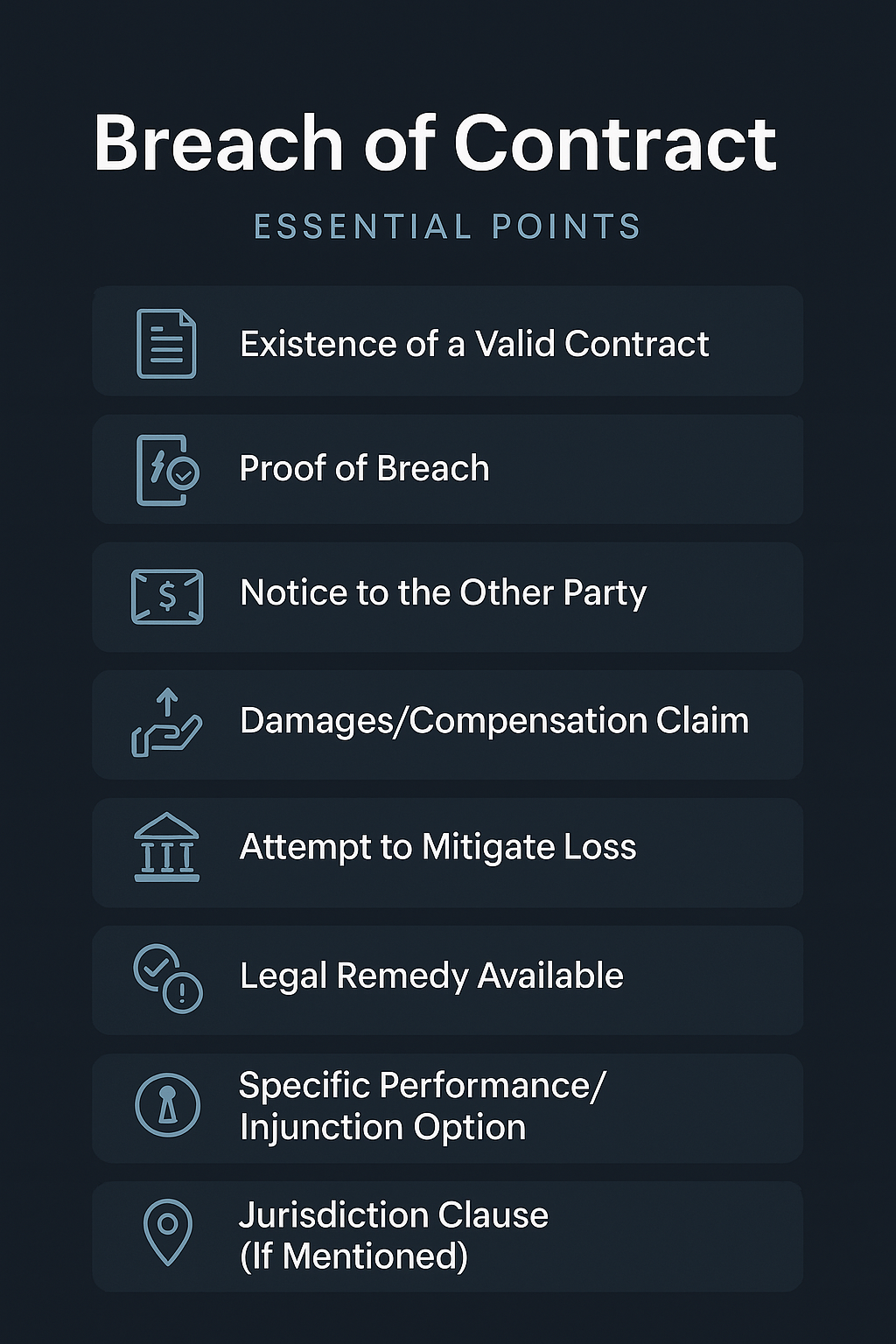How We Handle Breach of Contract Cases?
At SNS Legal Aid, we provide expert legal assistance in handling contract breaches, whether between businesses, employees, or partners. Contracts are legally binding agreements, and any failure to fulfill obligations can lead to legal consequences. Our approach includes:
- Contract Review & Analysis – Assessing the terms of the contract and determining the nature of the breach.
- Legal Notices & Demand Letters – Sending formal notices to the breaching party to seek resolution.
- Negotiation & Mediation – Attempting to settle disputes amicably to avoid prolonged litigation.
- Filing Civil Suits for Breach – Seeking compensation or specific performance in a court of law.
- Injunctions & Stay Orders – Preventing further breach or wrongful actions by the other party.
- Employment & Partnership Disputes – Addressing contract breaches between employers, employees, and business partners.
- Commercial Litigation & Arbitration – Resolving high-value disputes through arbitration and commercial courts.


Basic Laws & Acts Involved in Breach of Contract Cases
- Indian Contract Act, 1872 – Defines contract formation, performance, and consequences of breach.
- Specific Relief Act, 1963 – Provides remedies such as specific performance of contracts.
- Code of Civil Procedure, 1908 – Governs procedural aspects of contract-related disputes.
- Companies Act, 2013 – Regulates contractual obligations within corporate entities.
- Arbitration and Conciliation Act, 1996 – Facilitates dispute resolution through arbitration.
- Industrial Disputes Act, 1947 – Applicable to employment contract breaches in industrial sectors.
- Our Legal Services for Breach of Contract Cases
✅ Drafting & reviewing contracts to prevent disputes
✅ Sending legal notices & demand letters
✅ Filing lawsuits for damages & specific performance
✅ Representation in mediation & arbitration proceedings
✅ Handling employment & partnership disputes
✅ Defending against wrongful breach allegations
✅ Securing injunctions & stay orders
Frequently Asked Questions (FAQs)
A breach of contract occurs when one party fails to fulfill its contractual obligations, either partially or completely. This may include non-payment, delay in service delivery, or violation of agreed-upon terms.
- Material breach – A serious violation affecting the contract’s core purpose.
- Minor breach – A small failure that does not significantly impact the contract.
- Anticipatory breach – When one party indicates they will not fulfill the contract in the future.
- Fundamental breach – A severe breach justifying contract termination and legal action.
Legal remedies include:
- Compensatory damages – Monetary compensation for losses.
- Specific performance – Court orders to enforce contract terms.
- Rescission – Cancellation of the contract.
- Injunction – Preventing further violations.
You can issue a legal notice, negotiate for settlement, or file a suit under the Indian Contract Act, 1872 and Specific Relief Act, 1963.
Yes, depending on the contract terms and severity of the breach, you may have the right to terminate it and claim damages.
Employees can file a legal claim for unpaid wages, wrongful termination, or non-fulfillment of promised benefits under the Industrial Disputes Act, 1947.
Yes, verbal contracts are legally binding but harder to prove. Written agreements provide stronger legal protection.
Arbitration is a quicker, cost-effective alternative to court litigation. It is governed by the Arbitration and Conciliation Act, 1996.
You can send a legal notice, seek mediation, or file a suit for damages or dissolution of the partnership under the Indian Partnership Act, 1932.
We provide:
- Expert legal consultation & contract drafting
- Legal representation in civil courts & arbitration
- Settlement negotiations & mediation services
- Litigation support for financial or employment disputes

